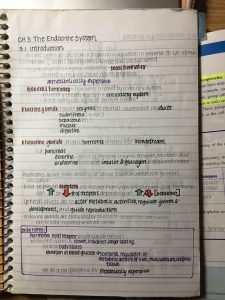 You’re premed!
You’re premed!
You’re a diligent student, and a hard worker.
Which means… as you study you take notes.
LOTS of notes!
Perhaps too many?
How neat are your MCAT notes?
How detailed are they?
As an undergraduate, I prided myself on taking very good notes. Approaching OCD level.
I had a collection of colored pens and highlighters.
My margins were perfect.
If a page had an inkblot or other mark, I tossed it.
Each page was properly dated.
And you could call my day ruined if I lost my my red pen.
If you wanted to copy my notes, I went to the copy machine with you,
because I didn’t trust others not to smudge or crease them.
I’m a geek, so I can brag that they were good, thorough, and complete.
But sometimes this can lead to challenges.
Are you a good note taker?
Are you a good MCAT note taker?
Before you answer that, ask yourself this for a second:
When was the last time you actually went back to check and review your notes?
I had a student show me seven neat binders for her MCAT notes.
Every page and every topic was very well detailed.
It took so much time and effort to create them.
“They’re beautiful!” I said. “When was the last time you reviewed them?”
Um…. turns out she was too scared and overwhelmed to review the notes.
Because she had way too many of them.
The average student attempts to cover all MCAT content in 2–4 months.
First, figure out what is feasible for you.
Then, to master a topic completely, you will need to follow these 5 steps.
Ask yourself, in your allotted time, will you be able to do the following?:
- Watch videos to learn content
- Use your book to verify and fill in gaps
- Work on practice questions
- Review
Is there time to do this list AND still create—AND REVIEW—detailed notes?
Chances are the answer is “No.”
Not on your strict schedule and fast approaching test date.
So how do you maximize study time and minimize wasted note taking?
I have two methods plus a doodling option that I recommend.
But before you begin, a word on strategy:
Everyone has a strategy that works for them.
The key is NOT to copy what worked for someone else.
The key is to test a few strategies and figure out what works best for YOU.
With that said, here are two methods I recommend investigating.
Option 1: The Minimal Notes Method
What do you actually need in your notes?
A couple of terms and equations to memorize?
Do you really need to rewrite the complete definition for homeostasis or endergonic reactions??
What’s the chance this will actually be tested on the MCAT?
You’re more likely to face a question relating to this concept, instead of the definition.
Your goal in studying should be simple content review.
Get the concepts, memorize the words, learn equations by active writing, and move on.
Let your notes reflect this.
Limit yourself to a single page of notes per chapter.
Make your English professor cringe!
No paragraphs.
Use incomplete sentences.
Use minimal words that get to the point.
Use arrows and lines instead of words.
For example, instead of explaining the pathway from gene to protein in a complete sentence, write something like this:
DNA -> mRNA -> post transcriptional modification -> exit cell -> ribosome + tRNA -> protein
Does it read well?
Not at all.
Does it get to the point fast?
Absolutely.
And it takes a matter of seconds to write.
This allows you to record the bare minimum.
But more importantly, it allows you to review the chapter in just 5-10 minutes.
If you study the right way and truly understand the information for the first time (by following these steps), then a simple 5 minute refresher should be all you need to quickly recall the information.
Thus a one-page outline will allow you to review a full month of learning in under 20 minutes!
By cutting your review time down, you have time to review more of what you've studied.
Imagine doing this every day, how well will you know these notes?
Extraordinarily well!!!
Below is an example of how I would cut a study hall member's notes down to less than 50% without sacrificing quality.
Option 2: The No-Notes Method
Be honest for a second.
Do you really even need notes?
For most students, the answer is “No.”
But how do you know what to memorize and review without taking any notes?
Highlighter for the win!
For example, here are notes from an MCAT study hall member.
These are relatively short and concise  compared to many others that I’ve seen.
compared to many others that I’ve seen.
But even so,
After reading an entire chapter and watching an entire video on the endocrine system, do you really need to explain WHAT the endocrine system is?
Focus on a few terms here that are important in her notes:
Exocrine vs Endocrine glands.
Definitely a must on the MCAT.
Remember, notes are simply to help with recall.
JUST Key words in each chapter will help you refresh on concepts.
What if THAT is all you highlight?
What if instead of writing it all,
This student simply highlighted a few words in her MCAT books?
Words like, “Endocrine” and “Exocrine.”
Perhaps highlight “receptor” and one example hormone/location?
An entire detailed page of notes turned into 5-10 highlights.
That’s it!
When you have a few minutes for content review, perhaps for the first 10 minutes of each study block,
instead of breaking open a 20 page detailed notes binder,
simply open your book to the chapter and review as follows:
Spot the highlighted word.
Close your eyes.
Mentally recall what that word is about.
Maybe visualize the processes.
Ask yourself if you feel comfortable in your knowledge.
Repeat the word/term/pathway 2-3 times.
All good?
Move on to the next highlighted word.
If no, quickly read the sentence before/after to refresh your knowledge.
If it’s still not clear, you probably never mastered it.
Go find a related YouTube video to verify that you get what’s going on.
Option 3: Doodles?
Maybe you don’t struggle with note taking.
You don’t have tons of detailed notes,
but somehow there are still a TON of papers all around you!
Random notes all over your desk? In your car?
End result: you’re still overwhelmed or procrastinating.
I have ADHD,
And I take good notes…
but sometimes I write for the sake of writing to keep my mind on the task at hand.
Focusing on the ACT of writing helps me focus on WHAT I'm writing/studying.
At the end of the week I would look through my backpack and pull out piles of papers,
but many of them were just doodles.
Useless scribbles and unnecessary notes.
Do you write for the SAKE of writing?
If you feel the need to write for the sake of writing, in order to pay attention,
Consider a whiteboard.
A whiteboard allows you to write as you need,
then you can erase when you're done!
This leaves no pressure to review mounds of notes down the line.
This eliminates the extra chaos of paper shoved into random pockets of your notebook.
Or an afternoon spent finally cleaning out your car to be sure those papers that were accidentally pushed under your passenger’s seat weren’t important!
Finally, if it’s JUST the memorization giving you trouble,
Be sure to use the audio summary for keyword and definition recall, as well as active writing for pathway and equation memorization.
Looking for more MCAT Advice? Click Here for more!



Thank you very much for this Advice. I found my fit and I am happy it confirms my way of study. I just highlight the important stuff and that saves me time in my preparation for the MCAT. Thank you
That’s awesome Albert! Glad you were able to find what works for you. I challenge you to try and cut another 5{4de72ea05502f43f582be05109791d04c2e06ba4d55e604218cbe1ea315cd788} of your note-taking to see if it helps you save even more time.
Thank you for this. I will try to implement these strategies. I have the Kaplan set so I will try and study the end of chapter review notes and focus more on reading the content through.
That’s great to hear Geraldo. Consider taking minimal notes in the margin for anything you feel you need to add.
Definitely too many notes in my notebook… but I turn the important concepts from my notebook into Anki cards to review. The note-taking helps me process when reading/listening to lectures, but the Anki cards help settle the important info.
Jay: There’s definitely an ‘attention’ factor to note-taking. That’s where I recommend a whiteboard.
Omg i sooooooooooo needed this
Awesome Terrissa! Did you implement this yet?
Great suggestions…I am so guilty of taking too many notes, and in doing so, I don’t try to understand the material while I’m reading, I convience myself that I will do that with my notes later. Sometimes you can’t see the forest for the trees…thank you.
Another great reason to cut down on the notes Chris. Focus on understanding NOW so you don’t get overwhelmed later.
I’m having this issue just studying for Cellular Molecular Bio. Not enough time to read and review all. Taking to many notes at home after class.